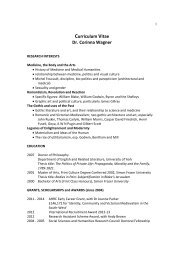'Cast out into the hellish night': Pagan Virtue and ... - Humanities
'Cast out into the hellish night': Pagan Virtue and ... - Humanities
'Cast out into the hellish night': Pagan Virtue and ... - Humanities
Create successful ePaper yourself
Turn your PDF publications into a flip-book with our unique Google optimized e-Paper software.
Philippa Byrne Ex Historia 50<br />
The notoriety of its author <strong>and</strong> its weighty subject matter have made De voluptate an attractive<br />
text for historians. Traditional interpretations hailed <strong>the</strong> work as representing nothing less than a<br />
turning point in <strong>the</strong> history of western philosophy. Focusing on Valla’s apparent sympathy with<br />
his first, Epicurean orator, it was argued that he had constructed a new vision of man based<br />
upon a more positive evaluation of voluptas (pleasure), writing <strong>the</strong> celebration of sensory<br />
pleasures <strong>into</strong> Christian doctrine, even to <strong>the</strong> extent of creating a ‘Christian Epicureanism’. 12<br />
William Bouwsma, for example, declared <strong>the</strong> composition of De voluptate as <strong>the</strong> moment at which<br />
humanism threw off <strong>the</strong> shackles of ascetically-inclined, medieval ‘stoicising’ Christianity. 13<br />
More recent historiography has, however, revised this view of Valla as a sensory revolutionary.<br />
Any depiction of De voluptate as a straightforward Epicurean broadside is undermined by its<br />
dialogic form, in which each succeeding orator criticises <strong>the</strong> moral philosophy of <strong>the</strong> previous<br />
speaker. Valla’s perspective cannot simply be aligned with that of <strong>the</strong> Epicurean speaker, for<br />
when Valla himself appears in <strong>the</strong> debate, it is to award ‘victory’ to <strong>the</strong> Christian orator. 14 Valla<br />
also offers <strong>the</strong> frequent observation that his Stoic <strong>and</strong> Epicurean spokesmen are only Christian<br />
orators adopting classical masks, with <strong>the</strong> aim of producing enlightenment through dialectical<br />
reasoning. 15<br />
Thus more recent historians have preferred to categorise Valla as a ‘Christian<br />
Humanist’, arguing that whilst Valla challenged <strong>the</strong> approach <strong>and</strong> methods of scholastic<br />
<strong>the</strong>ology, he did not fundamentally disagree with its conclusions. 16 De voluptate must be read in<br />
light of Valla’s broader aspirations for Christian reform. This is <strong>the</strong> approach particularly<br />
12 See Maristella de Panizza Lorch, ‘A Defense of <strong>the</strong> Senses in Lorenzo Valla’s Theory of Pleasure’ in Homo<br />
Carnalis: The Carnal Aspect of Medieval Human Life, ed. by Helen Rodite Lemay (Binghamton: Centre for<br />
Medieval <strong>and</strong> Early Renaissance Studies, 1990), pp. 121-128.<br />
13 William J. Bouwsma, ‘The Two Faces of Humanism’, in Itinerarium Italicum: The Profile of <strong>the</strong> Italian<br />
Renaissance in <strong>the</strong> Mirror of its European Transformations, ed. by Heiko A. Oberman <strong>and</strong> Thomas A. Brady Jr<br />
(Leiden: Brill, 1975), pp. 3-60.<br />
14 De voluptate III.xxviii [1] p. 321.<br />
15 Ibid., III.vii [6] p. 261.<br />
16 Charles Nauert, ‘Rethinking “Christian Humanism”’, in Interpretations of Renaissance Humanism, ed. by A.<br />
Mazzocco (Leiden <strong>and</strong> Boston: Brill, 2006), pp. 155–80; Jill Kraye, ‘<strong>Pagan</strong> <strong>Virtue</strong> in Pursuit of Christian<br />
Happiness: Renaissance Humanists <strong>and</strong> <strong>the</strong> Revival of Classical Ethics’, in Zeichen – Rituale – Werte.<br />
Internationales Kolloquium des Sonderforschungsbereichs 496 an der Westfälischen Wilhelms-Universität<br />
Münster, ed. by G. Althoff (Münster: Rhema, 2004), pp. 55–68.









